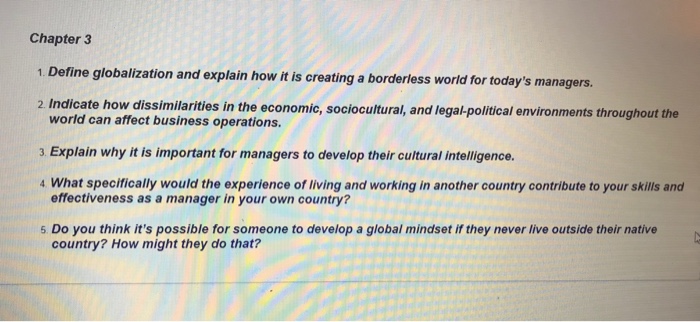Globalization is the process of increasing interconnectedness and interdependence among countries through the exchange of goods, services, ideas, and culture. It has greatly impacted the way managers operate and make decisions in their organizations. In this essay, we will explore some of the ways in which globalization affects managers.
One of the main ways in which globalization affects managers is by increasing the scope of their operations. With globalization, organizations can now easily access new markets and expand their operations to other countries. This requires managers to be more aware of the cultural differences and local regulations in these new markets, as well as the potential risks and opportunities that come with expansion.
In addition to expanding the scope of their operations, globalization also increases the level of competition that managers face. With the ability to access new markets and sell products and services globally, organizations are now competing with companies from all around the world. This requires managers to be more strategic and innovative in order to differentiate their products and services, and to stay ahead of the competition.
Another way in which globalization affects managers is by changing the way they approach decision making. In a globalized world, managers must consider a wider range of factors when making decisions, such as the impact of their actions on a global scale, the potential risks and rewards of different options, and the changing needs and preferences of customers in different markets. This requires a more flexible and adaptable approach to decision making, as well as a greater understanding of the global business environment.
Finally, globalization also affects the way managers interact with their employees and stakeholders. With increased globalization, organizations may have a more diverse workforce, with employees from different cultures and backgrounds. This requires managers to be more sensitive to cultural differences and to adapt their communication and leadership styles to be more inclusive and effective. Additionally, globalization also requires managers to be more transparent and accountable to stakeholders, as they may now be operating in multiple countries with different laws and regulations.
In conclusion, globalization has had a significant impact on the role of managers in organizations. It has expanded the scope of their operations, increased the level of competition they face, changed the way they approach decision making, and affected the way they interact with employees and stakeholders. To be successful in a globalized world, managers must be adaptable, strategic, and culturally aware.






